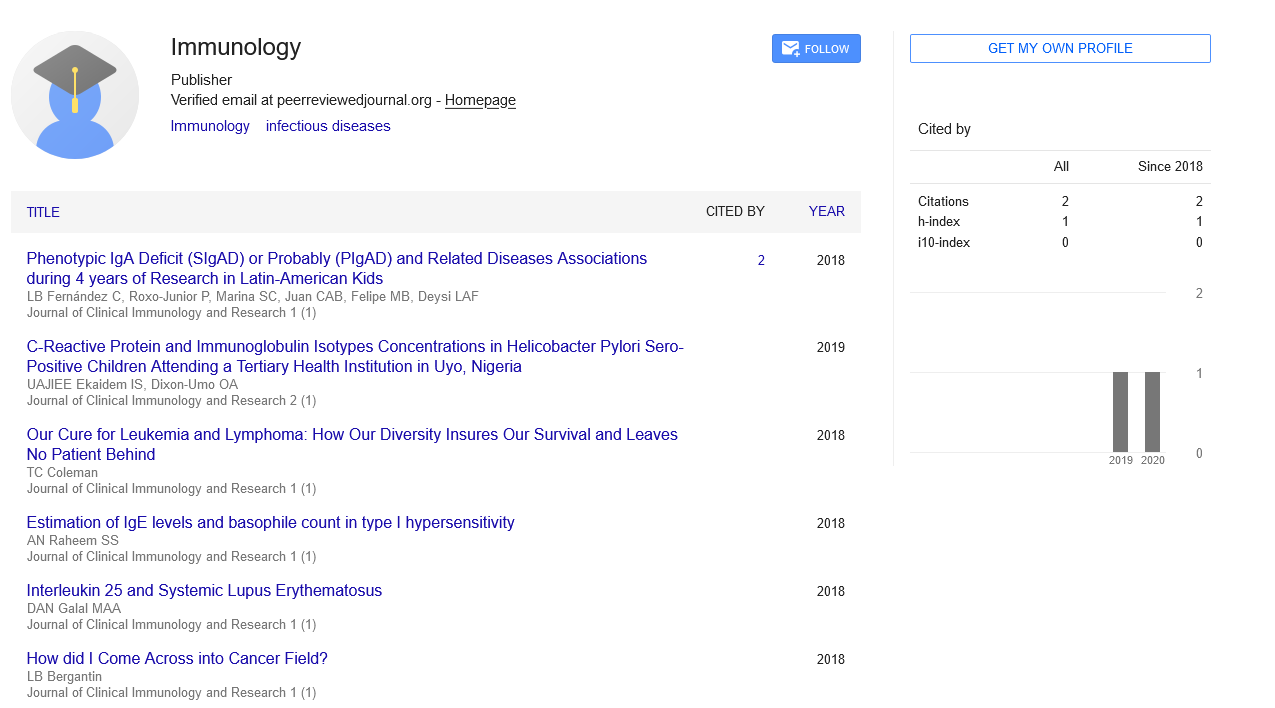Perspective, J Clin Immunol Res Vol: 8 Issue: 1
Immunological Markers in Cancer Diagnosis and Prognosis
Claire Thomas*
Department of Pediatrics and Child Health, Red Cross War Memorial Children's Hospital, University of Cape Town, Cape Town, South Africa
*Corresponding Author: Claire Thomas
Department of Pediatrics and Child Health, Red Cross War Memorial Children's Hospital, University of Cape Town, Cape Town, South Africa
E-mail:Claire.thomas@uct.ac.za
Received date: 27 December, 2023, Manuscript No. JCIR-23-123662;
Editor assigned date: 29 December, 2023, PreQC No. JCIR-23-123662 (PQ);
Reviewed date: 12 January, 2024, QC No. JCIR-23-123662;
Revised date: 19 February, 2025, Manuscript No. JCIR-23-123662 (R);
Published date: 26 February, 2025, DOI: 10.4172/JCIR.1000093
Citation: Thomas C (2025) Immunological Markers in Cancer Diagnosis and Prognosis. J Clin Immunol Res 8:1.
Abstract
Cancer remains a formidable challenge in modern medicine, with early diagnosis and effective prognosis playing pivotal roles in improving patient outcomes. Immunological markers have emerged as valuable tools in the realm of cancer research, offering novel insights into the complex interactions between the immune system and cancer cells. This manuscript explores the significance of immunological markers in cancer diagnosis and prognosis, shedding light on the latest advancements and their potential impact on patient care.
Keywords: Cancer, Diagnosis, Prognosis, Multifaceted
Introduction
Background: Cancer is a multifaceted disease characterized by uncontrolled cell growth and proliferation. Early detection and accurate prognosis are crucial for devising effective treatment strategies and improving patient survival rates.
Rationale: Immunological markers have garnered attention as promising candidates for cancer diagnosis and prognosis. The intricate interplay between the immune system and cancer cells presents a rich landscape for exploration.
Description
Immunological markers in cancer diagnosis
Tumor-Infiltrating Lymphocytes (TILs): TILs are immune cells that infiltrate the tumor microenvironment. Their presence and composition can provide valuable information about the anti-tumor immune response, aiding in the diagnosis of various cancers. Immune checkpoint inhibitors: The discovery of immune checkpoint molecules, such as PD-1 and CTLA-4, has revolutionized cancer treatment. Assessing their expression levels can guide diagnosis and predict responses to immunotherapy.
Tumor-Associated Macrophages (TAMs): TAMs play a crucial role in the tumor microenvironment, influencing cancer progression. Understanding their phenotype and function can contribute to improved diagnostic accuracy.
Cytokines and chemokines: The immune system secretes a myriad of cytokines and chemokines in response to cancer. Profiling these signaling molecules can aid in the identification of specific cancers and provide insights into their aggressiveness.
Immunological markers in cancer prognosis
PD-L1 expression: Programmed Death-Ligand 1 (PD-L1) expression on tumor cells is a key predictor of response to immunotherapy and is associated with overall prognosis in various cancers.
Tumor Mutational Burden (TMB): TMB reflects the total number of mutations within a tumor and has emerged as a prognostic marker, influencing the response to immunotherapy and overall patient survival.
Regulatory T cells (Tregs): Tregs play a dual role in cancer immunity, both suppressing anti-tumor responses and preventing autoimmune reactions. Evaluating their presence and function can offer prognostic insights.
Immune gene signatures: Advanced genomic techniques allow for the identification of immune gene signatures associated with favorable or unfavorable outcomes. These signatures serve as powerful prognostic tools.
Challenges and future directions
Heterogeneity: Tumor heterogeneity poses a challenge in the accurate assessment of immunological markers. Strategies to address and overcome this heterogeneity are essential for clinical implementation.
Standardization: Standardizing the assessment of immunological markers is crucial for their widespread use in clinical practice. Efforts to establish guidelines and benchmarks are needed to ensure consistency and reliability.
Integration with other biomarkers: Comprehensive cancer diagnosis and prognosis require the integration of immunological markers with other established biomarkers. Synergistic approaches can enhance predictive accuracy.
Personalized immunotherapy: Advances in immunotherapeutic strategies, including personalized vaccines and adoptive cell therapies, hold promise for tailoring treatments based on individual immunological profiles.
Conclusion
Immunological markers have emerged as indispensable tools in the diagnosis and prognosis of cancer. As our understanding of the intricate interactions between the immune system and cancer cells deepens, the potential for integrating immunological markers into routine clinical practice grows. Continued research, standardization efforts, and advancements in personalized medicine will undoubtedly shape the future landscape of cancer diagnosis and prognosis, offering new hope for improved patient outcomes.
 Spanish
Spanish  Chinese
Chinese  Russian
Russian  German
German  French
French  Japanese
Japanese  Portuguese
Portuguese  Hindi
Hindi 